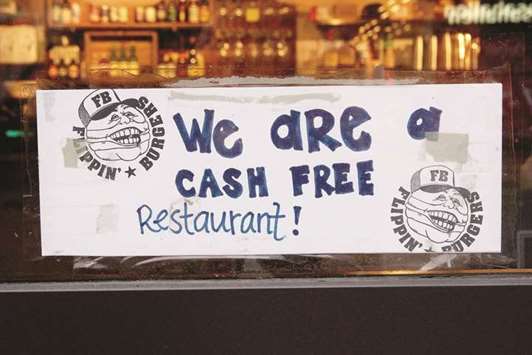While many countries are winding down use of physical money in favour of card and app payments, Germans are stubbornly clinging to the clink of coins and rustle of banknotes.
“In Germany, restaurant meals and groceries are paid for in cash more than twice as often than the European average,” says Holger Sachse of management consultancy BCG.
Many people are concerned about the reliability of the technology. “Only a quarter of consumers believe that cashless payments are safe,” Sachse adds.
It’s partly to do with German history: In a country where, only a couple of decades ago, people were being spied on by the Stasi, many are still understandably sceptical about using services that track their activity.
But what many Germans see as risky or too futuristic is a growing reality elsewhere. In Scandinavia, English-speaking countries and even emerging markets, cash is rapidly yielding to plastic cards and smartphone apps.
BCG says even India, famous for being one of the most cash-led societies in the world, is on course to phase out cash by 2022.
Deutsche Bank boss John Cryan admits that cash payments are “terribly expensive and inefficient.”
It goes against everything people associate with the German national psyche. And yet, the use of coins and bank notes is something that Germans apparently just don’t want to let go of.
In 2016, then finance Minister Wolfgang Schaueble’s proposal to set a 5,000-euro limit on cash transactions as an anti-crime measure drew a fierce backlash. Many people feared the abolition of cash, despite official reassurances that it was the right move.
In Germany, only one in 20 payments is processed by credit card, estimates Barkow Consulting. The average German keeps 2,200 euros in cash savings, says company founder Peter Barkow.
And according to a study by the European Central Bank (ECB), Germans carried an average 103 euros in their wallets in 2016, compared with 65 euros across the euro zone.
Between 2010 and 2016, the average proportion of cashless payments per person was 7 per cent, a BCG study has shown. That leaves Germany lagging behind other cash-heavy European countries, such as Portugal (9.8 per cent) and Austria (8.2).
In the US, UK and Scandinavia, credit cards are used regularly even for small transactions. Instead of a purse or wallet, people now tend to carry a flat holder with their driver’s licence and payment cards.
Only one in five store purchases in Sweden in 2015 were paid in cash. Asked how they had made their last payment in a survey by Germany’s Reichsbank, 70 per cent of respondents had used a card, compared with only 15 per cent who had paid in cash.
Some Swedish restaurants won’t even accept cash any more. In Stockholm’s hip Flippin’ Burgers restaurant, visitors are warned, “We are a cash free restaurant,” which catches many tourists unawares.
Compare that with Berlin, where it’s still not unusual to see signs reading “cash only.”
Children’s piggy banks may also have had their day, because pocket money in Sweden is increasingly paid onto junior accounts. Even at flea markets, many Swedes are now paying with their smartphones.
According to a recent Deloitte study, almost one in three Danes and one in four Swedes use their mobile phones for store purchases. Smartphone apps are also used to transfer money to friends or acquaintances, and to make eBay purchases.
“The Danes are already well on course for a cashless society,” says Deloitte technology expert Frederik Behnk. Danske Bank’s popular MobilePay app is accelerating the process in what is expected to be the first completely cashless country in the world.
Meanwhile, Paydirekt, Germany’s answer to Paypal, has failed to take off. Two years after its launch, the service has 1.6 million customers in Germany, compared with Paypal’s 19 million, and it is still only available through 20 per cent of major online retailers.
“Paydirekt is a typical example of banks running after a market that has long been fragmented,” says consultant Barkow. Financial companies underestimated Paypal’s dominance, and will now have to invest a lot of money and energy to keep up, he predicts.
But a powerful competitor could soon enter the German market. Apple is said to be planning its own payment service that would allow consumers to use their smartphones to pay in stores, taxis or via the internet. Perhaps that will be the development that finally weans the Germans off cash. – DPA

E-PAYMENTS: The Flippin’ Burgers Restaurant in Stockholm only accepts card payments. By contrast, in Berlin, many restaurants still only accept cash.
